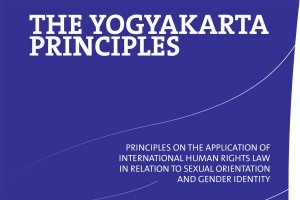The Yogyakarta Principles and intersex people

The 2006 Yogyakarta Principles on the application of international human rights law in relation to sexual orientation and gender identity are an important development, primarily furthering the rights of LGBT people, but with a crucial principle of particular interest to intersex people.
Principle 1: The Right to the Universal Enjoyment of Human Rights
All human beings are born free and equal in dignity and rights. Human beings of all sexual orientations and gender identities are entitled to the full enjoyment of all human rights.
Part B of Principle 18 is particularly relevant to the situation of intersex people. This section is highlighted below. We hope that it won’t always be a forgotten principle.
Principle 18: Protection from medical abuses
No person may be forced to undergo any form of medical or psychological treatment, procedure, testing, or be confined to a medical facility, based on sexual orientation or gender identity. Notwithstanding any classifications to the contrary, a person’s sexual orientation and gender identity are not, in and of themselves, medical conditions and are not to be treated, cured or suppressed.
States shall:
A. take all necessary legislative, administrative and other measures to ensure full protection against harmful medical practices based on sexual orientation or gender identity, including on the basis of stereotypes, whether derived from culture or otherwise, regarding conduct, physical appearance or perceived gender norms;
B. take all necessary legislative, administrative and other measures to ensure that no child’s body is irreversibly altered by medical procedures in an attempt to impose a gender identity without the full, free and informed consent of the child in accordance with the age and maturity of the child and guided by the principle that in all actions concerning children, the best interests of the child shall be a primary consideration;
C. establish child protection mechanisms whereby no child is at risk of, or subjected to, medical abuse;
D. ensure protection of persons of diverse sexual orientations and gender identities against unethical or involuntary medical procedures or research, including in relation to vaccines, treatments or microbicides for hiV/aids or other diseases;
E. review and amend any health funding provisions or programmes, including those of a development-assistance nature, which may promote, facilitate or in any other way render possible such abuses;
F. ensure that any medical or psychological treatment or counselling does not, explicitly or implicitly, treat sexual orientation and gender identity as medical conditions to be treated, cured or suppressed.
We encourage a full reading and implementation of the Principles, and we thank signatory and Argentinian intersex and trans activist Mauro Cabral for his key role in the process.
More information
2 Comments
Comments are closed.
These principles are written by social workers, psychologists and gender theorists. As such they are steeped in the paradigm gender dogma of John Money and his cohorts.
They are fine as far as they go – but like almost everything else the non-biologically diverse have to say on these matters, neither they nor their utterances seem capable of acknowledging human biodiversity.
All comprehension is focused into a world-view totally predicated on the Adam & Eve binary. Individuals with variant biologies are simply pulled into it and ultimately erased by it.
The final outcome is inexorably exactly the same as the starting point: more denial.
The Yogyakarta Principles the activists guide is built upon were written by human rights lawyers and experts. Applying the original 60-odd year old human rights declerations principles to gender identity and sexuality.
That Intersex wasn’t directly addressed in the original yogyakarta principles document is a problem but the 60-year old principles themselves are unchanged, they are the same basic human rights after all, the document just points out what applying the rights equally to GLBT means in the courses of action required of governments.
The same can and should be done for Intersex. It shouldn’t even be complicated to do on most rights. Heck it could even be fun. Get a group of Intersex people and some respected human rights experts (getting them seems the only tricky part), go through the list of human rights in the universal declaration, evaluate the access of Intersex people currently to each right then provide reccomendations for how that could be improved.
Things like no forced gender assignment, access to medical records, no medical requirement for recognition of self-defined identity, protection from discrimination, right to marry etc etc. All just the proper application of universal human rights to Intersex.
Hmm because of the travel costs for big fancy international conventions maybe that’d be best achieved with an online discussion forum where Intersex people could work together with Human Rights Experts to get such a document properly set forward?